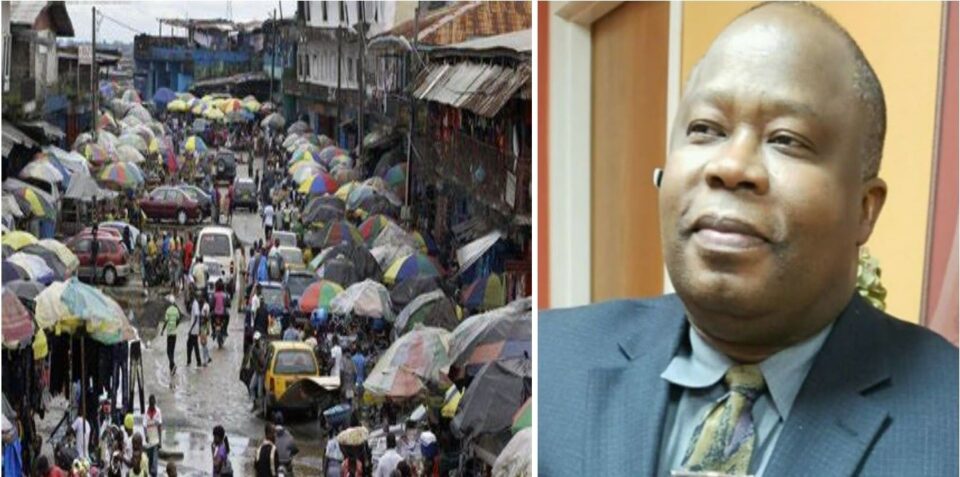PHOTO: The Author
By Austin S Fallah – A True Son of Liberia Social and Economic Emancipation
Our city Monrovia, the bustling capital city of Liberia, stands as a testament to resilience in the face of adversity.
However, if one were to look closer, beyond the surface of apparent normalcy, they would find a city gasping for breath under the intense stranglehold of urban stress.
This parley contends that our capital city Monrovia is a city burdened with challenges that stretch far beyond the psychological strain on its inhabitants.
From its overpopulated old infrastructure and environmental degradation to the social implications of rapid urbanization, Monrovia reflects a broader crisis, one that is tangible in every pothole, every overflowing drainage canal, and every crowded street corner.
This is a deep dive into the pulse of a city and a call for immediate and strategic interventions lest we lose the essence of what Monrovia signifies to all of us as a people and to our dear country.
Urban Infrastructure: The Achilles Heel:
Monrovia’s infrastructure has long served as a foundational concern, struggling to support the city’s expanding population.
Following the protracted civil unrest, the city has experienced significant migration, with rural citizens seeking safety and better opportunities within its precincts.
This unplanned and explosive growth far outpaced the capacity of existing, war-tattered systems engineered for a population of a fraction of its current size.
The city’s weak infrastructure is exemplified by its failing sanitation systems.
Rainy seasons morph into annual disasters as streets flood, overwhelming the inadequate drainage networks and leading to significant property damage and loss of life.
Additionally, it exposes a stark reality more water outside the homes than inside.
Access to clean, potable water remains a mirage for many residents, further emphasizing the irony of want in a land naturally endowed with abundant water resources.
Transportation, a critical aspect of a functioning city, is another element of infrastructure that is woefully deficient, but the government said this will soon improve through the provision of public buses.
With roads in a state of perpetual disrepair and public transportation limited to an informal fleet of aged and poorly maintained vehicles, traffic congestion and pollution are rife, contributing to the daily stress of commuting and the degradation of the environment.
Environment: The Unseen Victim:
Monrovia’s environmental degradation is a silent cry for urgent attention.
The very ecosystem that supports the city is being eroded by the effects of intense urbanization and neglect.
Mangroves that once protected the coastline and supported biodiversity are giving way to haphazard construction works, leaving the city even more vulnerable to the harsh Atlantic tides.
The city’s struggle with waste management is symptomatic of its strained relationship with the environment.
Waste both solid and sewage is routinely disposed of in open spaces and water bodies, leaching into soil and water sources, and putting public health at risk.
The visual impact is immediate and distressing, with litter-strewn beaches and streets, but the unseen chemical and biological consequences are even more threatening.
The effects of climate change compound these environmental issues, as sea-level rise and increased frequency of severe weather events put additional pressure on an already fragile ecosystem.
Yet, the response remains reactionary instead of proactive, with few resources allocated towards the development and implementation of sustainable environmental practices and policies.
Social and Economic Impact:
The stress on Monrovia’s infrastructure and environment bleeds into the socio-economic fabric of the city.
Overcrowded slums emerging from a housing deficit paint a dire picture of the living conditions of a significant portion of the populace.
In these densely populated areas, the prevalence of crime and the spread of diseases are accentuated by the absence of adequate law enforcement and health facilities.
Additionally, the scramble for resources and opportunities often leads to increased societal tension.
Unemployment remains high, especially among the youth, fueling discontent and sometimes leading to unrest.
The lack of recreational facilities and green spaces also contributes to the social strain, leaving little room for respite or community development.
The attraction of the urban promise has yet to be delivered for many of Monrovia’s residents, and the lack of scalability in economic strategies continues to hold back the potential for true wealth creation and distribution.
A city bursting at its seams with human talent and natural resources finds itself grappling with chronic poverty and inequality.
Call to Action:
Monrovia is indeed stressed beyond human imagination, but not beyond human intervention.
A multi-faceted and concerted effort must be deployed to address these challenges.
Strategic infrastructure development, especially prioritizing waste management, water accessibility, and transportation, should be at the forefront of national planning.
The introduction of modern urban planning principles can guide sustainable growth and mitigate further harm to the environment.
Investments in renewable energies, eco-friendly practices, and resilient city planning must be encouraged to safeguard Monrovia’s environment for future generations.
Additionally, social programs aimed at alleviating poverty, such as skills development and entrepreneurship support, can stimulate economic growth and social stability.
Monrovia’s cry is loud, yet it falls on deaf ears of complicity and neglect.
This city, representative of the vibrancy and potential of urban Africa, is a beacon that is dimming under the weight of its struggles.
As inhabitants, policymakers, and global citizens, Liberians must shake off inertia and embrace Liberian’s collective responsibility to restore the pulse of Monrovia.
We (Liberians at home and abroad) must embark on a transformative journey that resurrects the city from its stressed state to one that thrives, not just for its people, but as a living, airbreathing entity in its own right.
Monrovia’s tale of strain is a clarion call Liberians must answer, for in its resolution lies the hopes and dreams of a nation.

